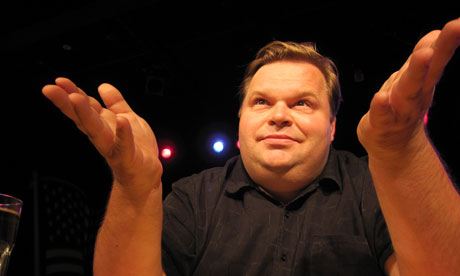
"How often do we wish that more things were handmade?" asks American monologist Mike Daisey. He stares us in the eye. "Now there are more handmade things than there have ever been in the history of the world." Most of those things come from China, where there are millions of hands – far cheaper than any machinery – to make them.
Daisey tells a fantastically good story and one that if you have an iPhone in your pocket you won't want to hear in this passionate and powerful exposé of the appalling working conditions in Apple's Foxconn factory in China. "Tonight," says Daisey, "is a virus." The show has already spread all over the US, raising awareness about the inhumane working conditions of thousands of Chinese workers.
Unfortunately, all recent focus has been on whether Daisey tells an entirely true story, although its essence remains undisputed. An excerpt from the show broadcast on the US radio journalistic programme This American Life was retracted after it was revealed that not everything that Daisey claimed to have witnessed and heard on his 2010 trip to China was verifiable. He had fabricated incidents for greater dramatic impact. It's an accusation that could, of course, be hurled at any number of playwrights who create fictions out of real experience and events. The imagination is not, and never should be, bound by the rules of journalism.
The difference is that, unlike Daisey, those writers do not claim – either on or off stage – that they are telling a true story. As Daisey says towards the end of the show about Apple products: "The way a thing is made is part of the design itself." That could be applied to Daisey's own monologue as much as it can to an Apple laptop, which may be beautiful but which Daisey suggests has "blood welling up between the keys".
This European premiere of Daisey's show, rewritten and reframed following the This American Life rumpus, inevitably feels as much about Daisey as it does about Apple and its founder, the late Steve Jobs, a man whose management style led co-workers to suggest "he would have made an excellent King of France". At times it feels as if it is Daisey himself who is on trial.
When Daisey says wryly "I really have an absurd amount of power over the narrative," refers to himself as a "fabulist" and declares "we don't like this story and we would do anything not to believe it," it sounds increasingly as if he is defending himself rather than trusting that his audience will know we are seeing a theatre show, not reading a fact-checked newspaper. The agony of Mike Daisey is that as the focus, he gets in the way of a very real and important story that doesn't just point the finger at Apple but at all of us who unthinkingly consume without ever considering how something is made.

